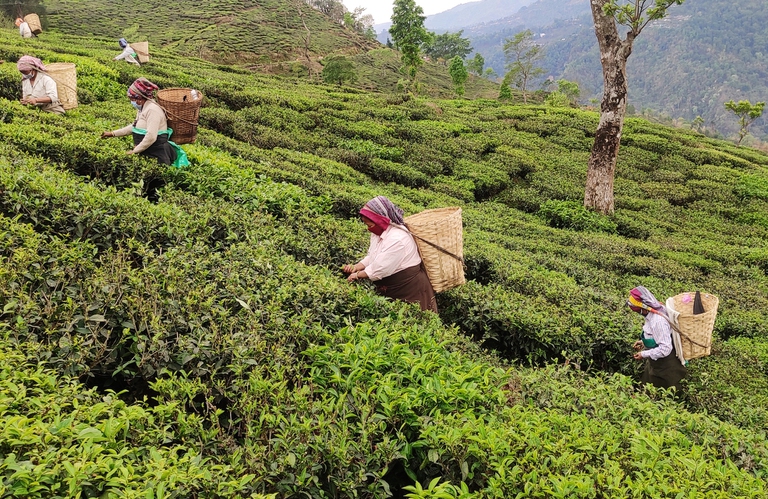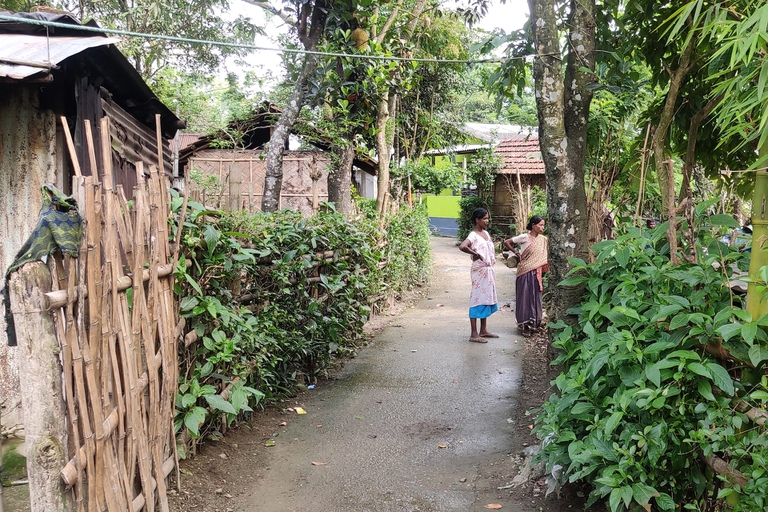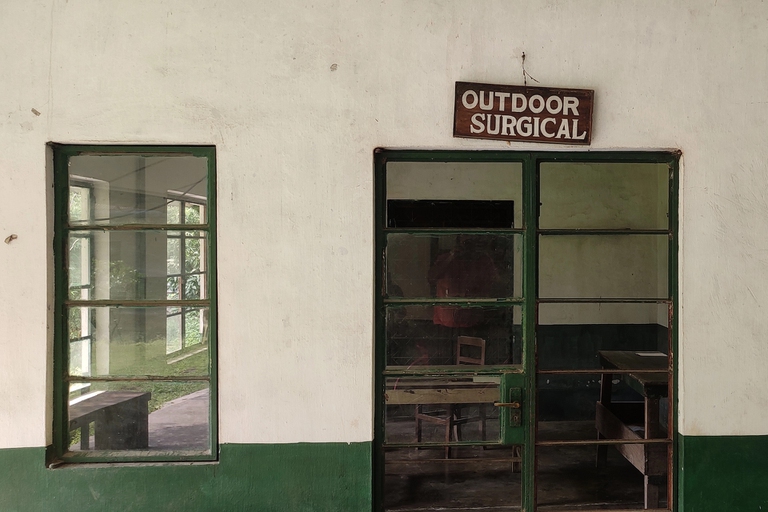
In response to a lack of public services, organisations and individuals are helping citizens weather the devastating Covid-19 crisis in India.
The second wave of the Covid-19 pandemic has shone a painful spotlight on the dire conditions of tea garden workers struggling against poverty in India.
Tea garden workers are among the communities who have most borne the brunt of the second wave of the Covid-19 pandemic that has torn through India, reaching its peak last April and May. The majority of the country’s over one million tea labourers live on the margins, struggling against poverty and illiteracy despite India being one of the world’s largest tea exporters, with the crop sold to countries such as Germany, China, Russia and Iran, among others.
The overall value of India’s tea exports, which earn the government a significant amount of foreign revenue, reached 830 million and 826 million US dollars in 2019 and 2020 respectively. Yet, tea garden workers’ conditions remain dismal in the face of a lack of even the most basic facilities.
Tea pluckers are paid a paltry wage of around three dollars a day for back-breaking eight-hour-long workdays. Whilst both men and women are among their ranks, the majority are women. Most tea gardens are situated in the remotest areas of hills and plains, where health facilities are scarce, and in some cases, workers have to walk for several kilometres even just to fetch drinking water.
Within the context of an already grim situation, the coronavirus pandemic has compounded tea workers’ problems. The nation-wide lockdown announced by Indian Prime Minister Narendra Modi in March last year brought work in tea gardens to a screeching halt. After a few months, work resumed but with fewer labourers, and the government mandated them to respect social distancing and follow pandemic-related protocols. During the second wave, the government also stressed the importance of testing for Covid-19 and conducting vaccinations to safeguard workers’ safety. Overall, over 181 million of India’s citizens had been inoculated against the coronavirus with two jabs as of 15 September, as announced by the health ministry.
But such rules seem to have remained on paper only. The reality on the ground tells a different story as health centres where testing is conducted are too far away from tea plantations, implying wage losses as tea gardens operate on a no-work-no-pay system. “The Covid-19 test would result in an off-day, which isn’t possible as I have family to look after,” says Sunita Tamang, 29, a tea garden worker in Dalgaon in West Bengal’s Alipurduar district, home to over 280 tea gardens employing nearly 400,000 people and an area known for “crush, tear, curl” tea, a processing method in high demand in India.
“The pandemic has already led to inflation and my children will sleep hungry if I take a day off. Instead, I’ll take medicine if I suffer from any of the disease’s symptoms,” Tamang adds.
Tamang isn’t alone. Many workers don’t want to get tested for fear of losing their livelihood if they were detected as having contracted the virus. “It’s nearly impossible to detect the severity of Covid-19 cases in tea gardens because people are reluctant to go for a medical examination as it would mean a deduction in their wages and loss of livelihood if it turned out positive,” explains tea union leader Arijit Mazumdar. “They try to ignore the symptoms by taking medicines from quacks that make their situation even more serious”.
“Deaths have occurred in tea gardens during the pandemic but the exact cause can’t be determined as no autopsies have been conducted,” he continues. “The health infrastructure in remote tea garden areas isn’t well-equipped enough to handle such things. The larger tea gardens have ambulances and health centres but smaller one doesn’t have any such facility”.
Mazumdar further points to how the shortage of vaccinations in India has also taken a toll on tea labourers. “The government should escalate inoculation among workers as they live in quarters that have little hygiene and social distancing. Some of them are also hesitant to take the jab as it requires rest for at least two or three days, which they can’t afford”.
The dire condition of health facilities adds further risks to the lives of tea garden workers. Situated in remote areas, there are hardly any doctors or medical staff available and in most of them patients aren’t treated for ailments beyond common colds and diarrhoea.
A case in point, the health centre at the Birpara Tea Estate in Dalgaon appears more like the set of a horror movie. The old and dilapidated building contains not much more than empty chairs and vacant rooms that are used by freely cats and dogs. “We don’t have a doctor here,” concedes Dharmi Lohra, a community health assistant at the centre. “There are nurses who come regularly but they can’t treat serious patients, which have to be taken to a government hospital located far away. A hospital here with adequate facilities would go a long way in saving lives”.
As in other areas of rural India, social distancing norms to prevent the spread of infectious diseases aren’t strictly followed in tea gardens. Workers live in cramped quarters with hardly any space to maintain distance. The age-old habit of open defecation is also common despite the government’s effort to build toilets under various welfare schemes. “There’s a general lack of awareness about all issues relating to hygiene, Covid-19 and health in general because the workers are too poor to think about these problems,” says Sujay Verma, a social activist based in West Bengal. “They just want to earn and survive without thinking much about Covid. Education would only bring awareness if the government were to open good schools in their localities”.
As the dusk envelops the sky, Tamang buys sweets for her children and starts off the journey to her small tinned house, knowing that she’ll return to the tea plantation the next day. Unfazed by the mayhem surrounding the pandemic, she points out that her children’s upbringing is more important to her than anything else in the world.
Siamo anche su WhatsApp. Segui il canale ufficiale LifeGate per restare aggiornata, aggiornato sulle ultime notizie e sulle nostre attività.
![]()
Quest'opera è distribuita con Licenza Creative Commons Attribuzione - Non commerciale - Non opere derivate 4.0 Internazionale.
In response to a lack of public services, organisations and individuals are helping citizens weather the devastating Covid-19 crisis in India.
A study indicates that the zoonotic origins of coronavirus may have been favoured by global warming’s impact on the conditions for bat habitats.
While Africa’s Covid-19 response has been praised by some, the pandemic has triggered the continent’s first recession in 25 years.
In Coronation, a documentary filmed by the people of Wuhan, the dissident Chinese artist documents the government’s rigid control during lockdown.
David Nabarro of the WHO analyses worldwide actions against the pandemic. Lockdowns alone aren’t a sustainable response to stopping Covid-19.
Kenya may fail to meet its target of ending female genital mutilation by 2022 as Covid-19 school closures have seen more girls undergo the illegal practice.
Helsinki Airport has begun implementing a Covid-19 test which is both noninvasive and simple. The exceptional nurses involved are dogs.
The drop in air pollution during worldwide lockdowns helped prevent thousands of premature deaths. But the situation is returning to pre-crisis levels.
The pandemic threatens some of the world’s most endangered indigenous peoples, such as the Great Andamanese of the Andaman and Nicobar Islands in India.










